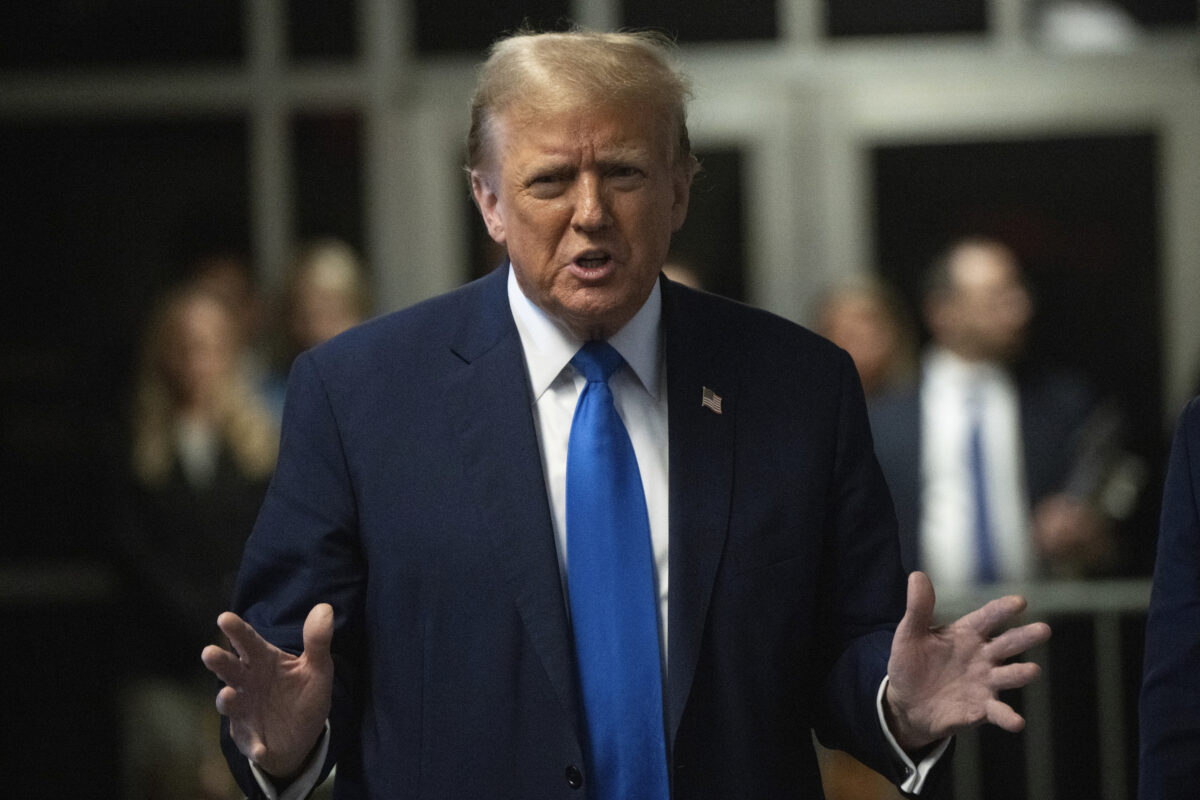Secret Service Has ‘Started Planning’ for What to Do if Trump Is Thrown in Jail: Report

Photographer: Victor J. Blue for The Washington Post/ Pool
The Secret Service is tasked with the solemn duty of protecting our current and former presidents, and regarding former President Donald Trump, the organization has reportedly already had meetings to plan how to handle his security if he ends up incarcerated for violating the gag order issued by Judge Juan Merchan in his hush money trial.
Trump is facing 34 felony counts for falsifying business records regarding alleged hush money payments to adult film actress Stormy Daniels before the 2016 election — a historic first-ever criminal trial of a former U.S. president. The ex-president has made headlines for reportedly falling asleep repeatedly (at least four times so far) and his ongoing grumbling about the gag order imposed by Merchan.
At a hearing Tuesday morning regarding the gag orders, Merchan sharply scolded Trump attorney Todd Blanche, raising his voice several times in frustration and even warning him at one point, “You’re losing all credibility with the court!” The judge said he would “reserve decision” on the matter, meaning he will issue an order at some later time, which could happen at any moment.
Most legal experts doubt that Merchan will actually toss the ex-president in the slammer, instead expecting the judge to impose fines, but it is technically an option that’s on the table — if not for the previous alleged violations, then for Trump’s continued comments attacking prosecution witnesses.
According to a report by ABC News, the Secret Service “held meetings and started planning for what to do if former President Donald Trump were to be held in contempt in his criminal hush money trial and Judge Juan Merchan opted to send him to short-term confinement,” citing as a source “officials familiar with the situation.”
During Tuesday’s arguments, prosecutors said they were “not yet seeking an incarceratory penalty,” asking Merchan to impose fines, but also highlighted Trump’s ongoing attacks and argued that he “seems to be angling for” being imprisoned.
The ABC News report added that the officials “do not necessarily believe Merchan would put Trump in a holding cell in the courthouse but they are planning for contingencies.” These sources added that the discussions had not yet gotten to the point of discussing what to do if Trump is convicted and sent to prison, in this case or in the other three criminal matters pending against the former President, including two federal cases and one in Georgia.
CNN’s Wolf Blitzer reported Tuesday evening about these Secret Service discussions, adding that they had included court officers and the New York Department of Corrections.
The Secret Service would not comment on specific discussions or plans for protecting Trump, but issued a statement:
Under federal law, the United States Secret Service must provide protection for current government leaders, former Presidents and First Ladies, visiting heads of state and other individuals designated by the President of the United States. For all settings around the world, we study locations and develop comprehensive and layered protective models that incorporate state of the art technology, protective intelligence and advanced security tactics to safeguard our protectees. Beyond that, we do not comment on specific protective operations.
The New York Times’ reporting cited two sources saying that the “impromptu meeting” with federal, state, and city agencies to discuss how to manage imprisoning Trump was instigated by the prosecution’s arguments regarding the gag orders, specifically the request that Merchan expressly remind the former president he could, in fact, be thrown in jail for contempt.
The short-term incarceration Trump might face for violating a gag order would be in a courthouse holding cell, not a regular state jail or federal prison that he might find as his new address if he’s convicted in any of the cases against him.
“The far more substantial challenge — how to safely incarcerate a former president if the jury convicts him and the judge sentences him to prison rather than home confinement or probation — has yet to be addressed directly, according to some of a dozen current and former city, state and federal officials interviewed for this article,” reported the Times, adding that it would require “keeping him separate from other inmates, as well as screening his food and other personal items,” plus making accommodations for a rotating detail of Secret Service agents to protect him 24 hours a day, seven days a week. Despite the normal prohibition on firearms in prisons, Trump’s agents “would nonetheless be armed.”
Spokespeople for New York City jails and New York State prisons both declined to give specific answers about how they would handle having a former president among their inmates, but did tell the Times that they would be able to properly assess any security needs and provide appropriate accommodations. Several city jails and state prisons “have been closed or partly closed, leaving wings or large sections of their facilities empty and available,” the Times learned from former corrections officials who opined that such facilities could be adapted to hold Trump and his Secret Service protective detail.





Comments
↓ Scroll down for comments ↓